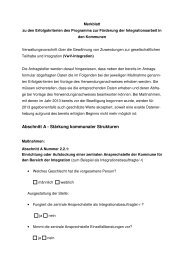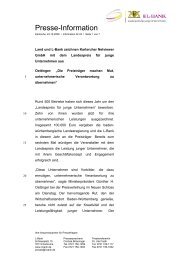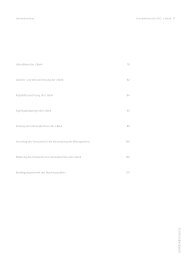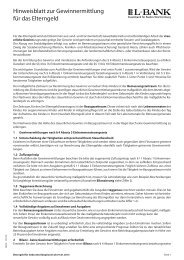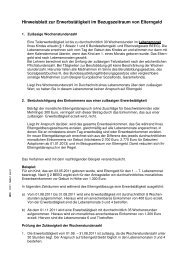Landeskreditbank Baden-Württemberg - L-Bank
Landeskreditbank Baden-Württemberg - L-Bank
Landeskreditbank Baden-Württemberg - L-Bank
You also want an ePaper? Increase the reach of your titles
YUMPU automatically turns print PDFs into web optimized ePapers that Google loves.
Enforcement Powers<br />
In order to secure compliance with the German <strong>Bank</strong>ing Act and the regulations issued thereunder, the<br />
BaFin and the Bundesbank may require information and documents from a bank and the BaFin may examine a<br />
bank without having to give any particular reason. The BaFin may attend meetings of the bank’s supervisory<br />
board, its managing board and shareholders (and require such meetings to be convened). In practical terms,<br />
because the BaFin has access to our books and records in Germany, it is able to monitor our worldwide activities.<br />
To ensure that German banks, including us, fully comply with all applicable legislation and reporting<br />
requirements, the BaFin requires that they maintain an effective and independent internal auditing department of<br />
adequate size and quality. A bank must also establish a written plan of organization, which sets forth the<br />
responsibilities of its employees and operating procedures. The internal auditing department must examine<br />
compliance with this plan and these responsibilities and procedures.<br />
If the BaFin discovers irregularities, it has a wide range of enforcement powers. The BaFin can challenge<br />
the qualifications of the bank’s management. If the Own Funds of a bank are not adequate, or if the liquidity<br />
requirements are not met and if the bank has failed to remedy the deficiency within a period set by the BaFin, the<br />
BaFin may prohibit or restrict the distribution of profits or the extension of credit.<br />
If a bank is in danger of defaulting on its obligations to creditors, the BaFin may take emergency measures<br />
to avert default. In this connection, it may, inter alia: (1) issue instructions relating to the management of the<br />
bank, (2) prohibit or restrict the acceptance of deposits and the extension of credit, (3) prohibit or restrict the<br />
management of the bank from carrying on their functions and (4) appoint supervisors. If these measures are<br />
inadequate, the BaFin may revoke the bank’s license and, if appropriate, order that the bank be closed. To avoid<br />
the insolvency of a bank, the BaFin has the authority to prohibit payments and disposals of assets, to suspend<br />
customer services, and to prohibit the acceptance of payments other than the payment of debt owed to the bank.<br />
In addition, violations of the German <strong>Bank</strong>ing Act may result in criminal and administrative penalties.<br />
Powers of the European Central <strong>Bank</strong> Affecting L-<strong>Bank</strong>’s Conduct of Business<br />
The European System of Central <strong>Bank</strong>s (“ESCB”) consists of the European Central <strong>Bank</strong> (“ECB”) and the<br />
national central banks of the 25 Member States of the European Union (the “National Central <strong>Bank</strong>s”). The ECB<br />
and the National Central <strong>Bank</strong>s of the 12 Member States of the European Union that have transferred their<br />
monetary sovereignty to the ECB and have introduced the Euro as their currency are referred to as the<br />
“Eurosystem”. The primary objective of the ESCB is to maintain price stability, to define and implement the<br />
monetary policy of the European Community, to conduct foreign exchange operations, hold and manage the<br />
official foreign reserves of the Member States and promote the smooth operation of payment systems. The ESCB<br />
is governed by the decision-making bodies of the ECB.<br />
The National Central <strong>Bank</strong>s of the Member States of the European Union that are part of the Eurosystem<br />
retain the functions that are not transferred to the Eurosystem. Thus, the Bundesbank continues to act as discount<br />
window for banks for eligible securities whereby the discount rate is computed on the basis of the so-called base<br />
rate. The base rate is adjusted on January 1 and July 1 of each year by the number of percentage points by which<br />
the ECB’s interest rate for its most recent main refinancing operations has been raised or lowered since the last<br />
change in the base rate.<br />
The ECB requires credit institutions, including us, established in the 12 Member States of the European<br />
Union that are members of the Eurosystem, to hold minimum reserves on accounts maintained with their<br />
respective National Central <strong>Bank</strong>s, which, in our case, are held by the Bundesbank. In its regulation on minimum<br />
reserves, the ECB, currently as of September 12, 2003, set a 0% reserve ratio on the following liability<br />
categories: “deposits with agreed maturity over two years,” “deposits redeemable with notice period over two<br />
years,” “repurchase agreements (repos)” and “debt securities issued with an agreed maturity over two years.” For<br />
all other deposits, debt securities issued and money market instruments, the ECB set a 2% reserve ratio. The ECB<br />
43



